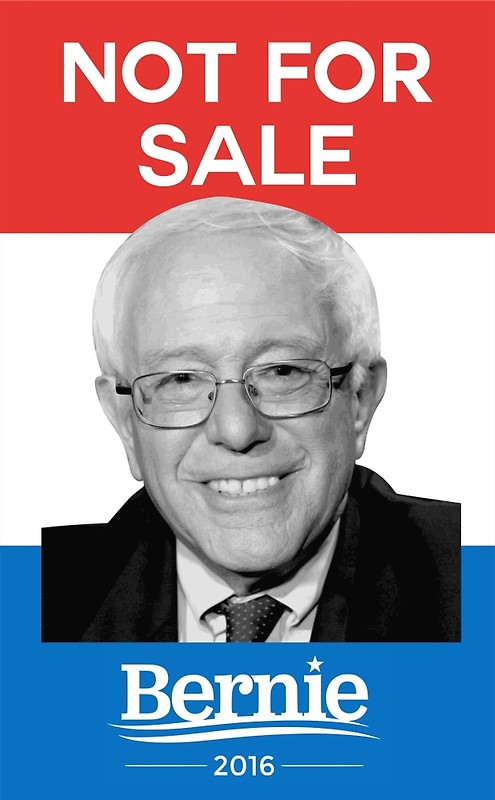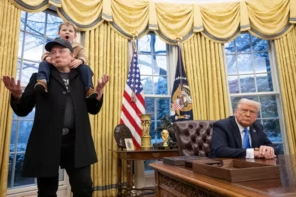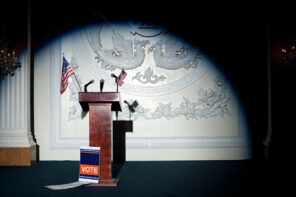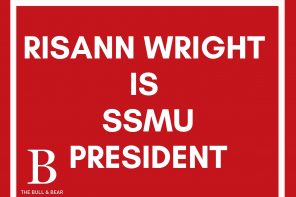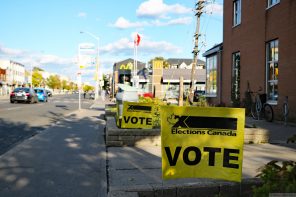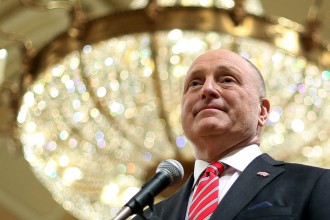“CEO’s of multinationals ain’t gonna like me, and Wall Street is going to like me even less”, blared Senator Bernie Sanders (I-VM) during the third Democratic debate, the crowd’s applause roared in response. Once again, for another election season, Wall Street banks unwillingly find themselves in the spotlight. Unlike 2008, when Wall Street accidentally landed in the top spot for notoriety, this time around their inclusion into the public scene has been more deliberate and planned. At the centre lies investment giant Goldman Sachs, which for the left has become the symbol of greed, fraud and the political corruption that pervades Wall Street and Washington.
Even though anti-Wall Street rhetoric has become a typical of Democratic nominees, Sen. Sanders’ main rival, and Democratic front-runner, former Secretary of State Hillary Clinton has been unable to distance herself from Wall Street. In 2014, Secretary. Clinton received $675,000 in speaking fees from Goldman Sachs. This only strengthens the rhetoric employed by Sen. Sanders that, in contrast to himself, Sec. Clinton is a candidate bought and paid for by Goldman Sachs and other wealthy donors. But why is this campaign of visceral attacks against Wall Street helping the Sanders’ campaign?
To answer that question we need to go back to 2008. After years of economic growth and strong performances, Wall Street speculation and fraudulent trading in housing-market securities caused the US economy to crash. The Great Recession, as it has been coined, was the single biggest economic downturn the U.S. had faced since the Great Depression of the 1930’s. Unemployment soared from 5% in 2008 to 10% by late 2009, before creeping down in mid-2010; median household incomes fell from $106,591 in 2005 to $68,839 in 2011; a decline of nearly 35%. In total, nearly $16 trillion evaporated from the economy, including the retirement savings and pension funds for many hard-working Americans. Americans were angry and hurting- and they demanded change.
Now that the economy had been broken, a punishment following the parameters of the Pottery Barn Rule – ‘you break it, you buy it’ – should have been administered. No?
Well, instead of the drastic legal action and prosecutions that usually follow this sort of white-collar fraud, the wrongdoers got a taxpayer-funded bailout to the tune of $700 billion dollars. No one went to jail; no one was tried. Cash flew out from public coffers and into those of the Big Banks. CEOs even received extravagant bonuses. Meanwhile, American workers were being laid off by the millions, and hundreds of thousands more lost their homes.
“Goldman Sachs [was] recently fined $5 billion. Goldman Sachs has given this country two secretaries of Treasury, one under Republicans, one under Democrats.”
–Senator Bernie Sanders
In 2008, Barack Obama promised significant reform to the financial sector. He kept his word by passing the Dodd-Frank Act that brought necessary government oversight over the banking industry. Yet throughout this time, the banks that were deemed ‘too big to fail’ in 2008 got even bigger and their chokehold on the American economy grew even tighter. The lackluster prosecutions and absence jail sentences following the crisis has left many Americans still unconvinced that President Obama went far enough to punish the big banks.
This sentiment was echoed through polling. Five years after investment giant Lehmann Brothers collapsed triggering the Great Recession, polls taken by Reuters in 2013 found that:
- 44 % of those polled believed the government should not have bailed out financial institutions;
- 53% thought not enough was done to prosecute [responsible] bankers;
- About one-third of those polled said breaking up the big banks would help the economy; nearly twice the number of people who thought it would hurt;
- A majority of those polled said Wall Street bankers, traders, and executives were still paid too much; more than half wanted the government to do more to punish those responsible for the crisis.
“Let’s not insult the intelligence of the American people. People aren’t dumb.”
-Senator Bernie Sanders
To say that the banks went completely unpunished would be a fallacy. There were countless Senate hearings with Wall Street CEOs, Ben Bernanke, the Federal Reserve Chairman, Timothy Geithner, the Secretary of Treasury, and the SEC. The banks were fined $235 billion between 2008 and 2015; Bank of America paid the single largest fine of $80 billion, followed by JP Morgan’s $40 billion fork-over. However, these were not enough for the American people. They wanted to see castigation for all the pain they had been put through.
The Senate hearings did little to convince Americans that greater accountability was being brought to Wall Street. Americans watched the heads of Big Finance sit in front of senators and deny any knowledge of wrongdoing, claiming that the ongoing crisis was unforeseeable and beyond the control and responsibility of any one individual. In one of those hearings, when his bank was accused of fraudulent activities related to advice given to investors, Goldamn Sachs CEO Lloyd Blankfein famously said that his bank had no obligation to tell its investors purchasing financial instruments what Goldman’s investment positions on the same financial instruments were. As it turned out, on several investment positions that Goldman had sold to investors, the bank had actually bet against the investment.
But how come none of the CEO of Wall Street firms were sent to jail? Even after whistle blower Alayne Fleischmann gave detailed accounts of the fraud being committed by JP Morgan, how come the Department of Justice (DOJ) and Attorney General Eric Holder couldn’t find a single shred of evidence to prosecute JP Morgan executives?
Mr. Holder and his department’s fickle response is actually not due to a lack of prosecutor-zeal on the part of the DOJ, but from a calculated decision to prevent further economic instability. To its credit, the DOJ, under the new Obama administration, did start prosecuting Wall Street employees. In 2009, it prosecuted two hedge fund managers from Bear Stearns for financial misconduct related to a $1.6 billion investment portfolio that failed. The men were however acquitted by a jury, and the pervasive sentiment of fragility in the economy halted any further proceedings against other financial-sector executives. This stems from a policy guideline that Mr. Holder had himself created in 1999, when he was the Deputy Attorney General for President Clinton. The 1999 memo prepared by Mr. Holder advised prosecutors to consider “collateral consequences” (instabilities and turbulences caused in the markets) when prosecuting heads of big financial institutions. That is exactly what happened in 2008.
By 2012, nearly five years after most of the financial crimes were committed, the five-year statute of limitation for ordinary criminal fraud charges had passed. However, the DOJ could still bring civil lawsuits against individual bankers and banks under banking laws that allowed for a ten-year statute of limitation. In 2012, after a fiery State of the Union address, President Obama directed his attorney general to investigate the root cause behind the financial crisis. This seemed like a winning moment for the American public. However, instead of prosecutions, the DOJ’s strategy turned to threatening financial institutions with the release of public information on the bankers’ wrongdoings; the other option was that the banks could settle out of court with the government in exchange for the ability to deny any wrongdoing. This came even as watchdog groups pointed asserted that individual prosecutions are better at preventing illegal activities than fines.
As bank after bank went into settlement deals with federal agencies, Mr. Holder’s action garnered widespread praise from the media. While the banks paid upwards of $200 billion dollars in settlements and fines, the lack of any real punishment meant that no individual was held accountable for their actions. The message sent to the banks was that they could carry on and only face a fine should they tank the world economy. Fines and settlements were just the costs of doing businesses on Wall Street.
“Congress does not regulate Wall Street. Wall Street regulates Congress”
-Senator Bernie Sanders
If we take a step back, the reasoning behind the Holder Doctrine is understandable, especially since large financial institutions can make or break the US economy, as the term ‘too big to fail’ might imply. Mr. Holder and other regulators, as well as their successors have had to tread a very fine line so as to not upset the markets. However, the general populace has perceived this as the doings of political elites unwilling and incapable of going after the “Billionaire Class”.
For a while after 2013, Wall Street’s crimes moved out of the public spotlight as banks quietly paid their fines and Americans celebrated the upholding of Obamacare and marriage equality by the Supreme Court (or didn’t). That ended when a small time liberal senator by the name of Bernie Sanders from Vermont started climbing in the polls, making economic inequality and injustice key components of his presidential campaign. As Sen. Sanders bemoaned a shrinking middle class and a rigged economy the big banks were at the epicenter.
In retrospect, in the immediate aftermath of 2008 and the large period of financial uncertainty that was present, it would have been insufferably difficult for President Obama or Mr. Holder, let alone Sen. Sanders to bring about drastic change. Now, however, with the economy much stronger, Sen. Sanders and his supporters feel that they can seize this window of opportunity. Consequently, Goldman Sachs has become a scapegoat and the symbol of everything that Sanders and his supporters feel is wrong with the U.S. political system.
“This Campaign is not just about electing a president. What this campaign is about is creating a process for a political revolution in which millions of Americans, working people who have given up on the political process … tens of millions of people, together to demand that we have a government that represents all of us — not just the one percent.”
-Senator Bernie Sanders
In the light of this, is it really surprising that so many Americans are uniting under Sen. Sanders’ anti-Wall Street banner? Many Americans are angry because President Obama had promised them ‘change’ and failed to live up to expectations (even when the Democrats had full control of both the House and the Senate). They are angry that young Americans are graduating with hundreds of thousands of dollars in student debt and can’t find decent jobs to pay it off. They are angry that far too few people control too much and that the concerns of the ordinary Americans are drowned out by Wall Street dollars. To rub salt on their wounds, they witness people like Mr. Blankfein and Jamie Dimon of JP Morgan make tens of millions in bonuses during America’s toughest years in recent memory even though many would say it was their banks’ recklessness that brought about the crisis. So when a “socialist” candidate from Vermont, with a proven record of fighting against inequality, is promising to eliminate student debt, bring universal health care, all while reigning in the excesses of Wall Street, of course this marginalized middle class is going to support him.
Ultimately Sen. Sanders’s strength is that he acknowledges the pain of everyday Americans. With this empathy he is playing into the latent anger already present from voters and encouraging them to get angry and demand change. He isn’t the outsider many have called him to be, but rather he is the progressive that many Americans longed for since G.W. Bush left office.
The views expressed in this opinion piece are the author’s own and do not necessarily represent those of The Bull & Bear.

